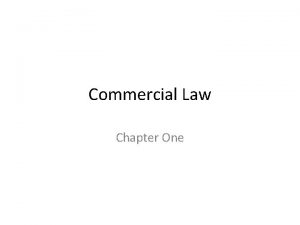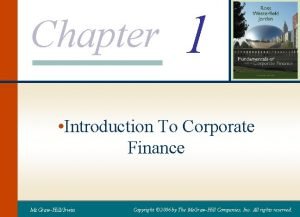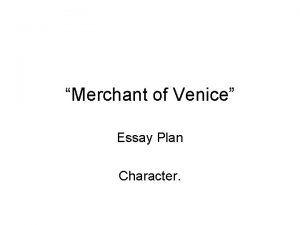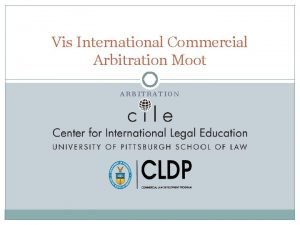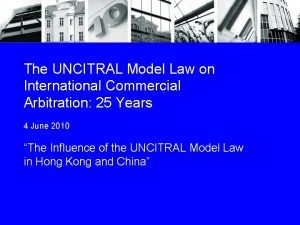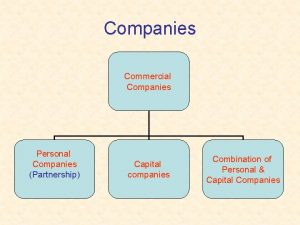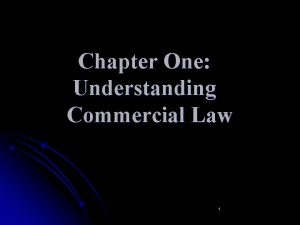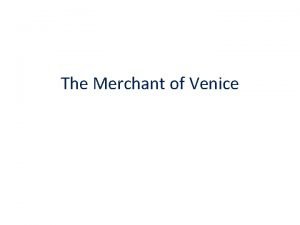Commercial Law Commercial acts Merchant Commercial Companies Introduction













- Slides: 13

Commercial Law -Commercial acts - Merchant -Commercial Companies

Introduction Will study; - Definition of commercial law. - Characteristics of commercial law. - Subject of commercial law. - Sources of commercial law.

Introduction - Definition of Commercial Law: - defined commercial law as being a branch of private law that governs a certain category of acts: commercial acts and a certain group of persons ( merchants ). - It was closely linked to civil law which is, in fact, considered the basis of all the other branches of private law. But commercial law deals with commercial acts and merchants it is considered more restricted than civil law which includes the general rules organizing and governing the legal relations between individuals whatever their profession or the nature of their acts.

Introduction - Characteristics of commercial law : This is due to radical difference between civil life and commercial life whereby it is difficult to apply the rules of civil law to commercial life: The difference is manifested in: A)- Rapidity: one of the most important characteristics of civil life is lacking speculation or at least minimizing the role it plays. The individual’s properties and profession provide him with his source of living. His role is limited to managing these properties without using them in acts of a speculative nature. This management may push him sometimes to go forward with some operations or to conclude some contracts, the aim of which is often to preserve his capital rather than realize profit.

Introduction The individual is indeed less concerned with acquiring material gain rapidly and more interested in preventing his financial assets from being diminished. Consequently, his acts are extremely careful and thought out. Hence, civil life is traditionally thought of as one based on solidity and stability.

Introduction B) Credit: credit means granting the debtor time to pay up. The merchant may buy merchandise and be unable to pay for it immediately, the seller then gives him credit, i. e. gives him time to pay his debt. If the person refrains from granting the merchant his trust, the latter turns to a bank for a loan that will allow him to pursue his activity and that he will have to pay back when it is due. Credit is important in commercial life, to an extent that the legislator supported it through a series of rules in commercial law among which bankruptcy and presumption of solidarity between those having commercial debts, when there is more than one, with no need for an explicit agreement or provision of law.

Introduction - Subject of commercial law. The subject of commercial law is defined according to one of theories set by the doctrine: the material theory and the personal 1)- The material theory: - A group of jurists considered that the axis of commercial law provisions or the basis of their application is the nature of the act itself. Hence, commercial law is the law applied to commercial acts whether the person doing these acts is a merchant or not.

Introduction - This theory was criticized for it required a clear definition of commercial acts and this is difficult for the legislator considering that, with the modern economic development, new commercial acts emerge every day. Moreover, the idea of commercial acts allows the explanation of some commercial law provision while it still fails in explaining other provisions such as bankruptcy, keeping commercial books ….

Introduction 2)- The Personal theory: Another doctrine see commercial law applied to merchants. i. e. the person who select commercial activity to be their regular profession. As for non- merchants, they are not subject to the provisions of commercial law even if they trade. - The Saudi legislator adopted both theories the material and the Personal.

Introduction - The sources of commercial law: -First: formal sources: 1)- Islamic sharia: - Islamic sharia is the first source the judge refers to in resolving them. 2)- Agreement: - Agreement between contractors is the second source the judge refers to in resolving them. 3)- Legislation: - Legislation is the third source of commercial law after the agreement of contractors.

Introduction 4)- commercial custom and usages of trade: - Commercial custom is a large and generally observed course of conduct. It is the practice of merchants, which by common adoption and acquiescence and by long and unvarying habit, has become compulsory. It is considered a main source of commercial law, next in importance to legislation. The judge turns to it in case he missed the legislative text for resolving the litigation at hand. - Custom was behind of the new commercial code rules such as the presumption of solidarity between debtors in commercial operations …. .

Introduction - If the judge didn’t find a commercial custom to rule in the matter at hand, he has to apply the usages of trade. The usages of trade are different from commercial custom in that merely represent the material element of the latter. It is a rule that merchants have the habit of applying regularly without believing that it is compulsory or that it should necessarily be respected. Usage, contrarily to custom, is not compulsory due to an external one.

Introduction Second: Informal sources: 1)- Jurisprudence ( decisions of the courts ): - By Jurisprudence, as a source of law, we mean the set of legal principles from court decisions. 2)- Doctrine: - we mean by Doctrine the body of opinions on legal matters expressed in books and articles. Doctrine is not a formal source of the law, but rather an explanatory one. This does not undermine of the importance.
 Introduction to commercial law
Introduction to commercial law Introduction to corporate finance what companies do
Introduction to corporate finance what companies do Newton's first law and second law and third law
Newton's first law and second law and third law Newton's first law of motion
Newton's first law of motion V=k/p
V=k/p Avogadro's law constants
Avogadro's law constants Discuss how modifiers influence/affect human acts.
Discuss how modifiers influence/affect human acts. Commercial acts
Commercial acts Conclusion merchant of venice
Conclusion merchant of venice Introduction of merchant banking
Introduction of merchant banking Noncommercial food service
Noncommercial food service Commercial law outline
Commercial law outline Uncitral model law on international commercial arbitration
Uncitral model law on international commercial arbitration Uncitral model law on electronic signatures
Uncitral model law on electronic signatures
